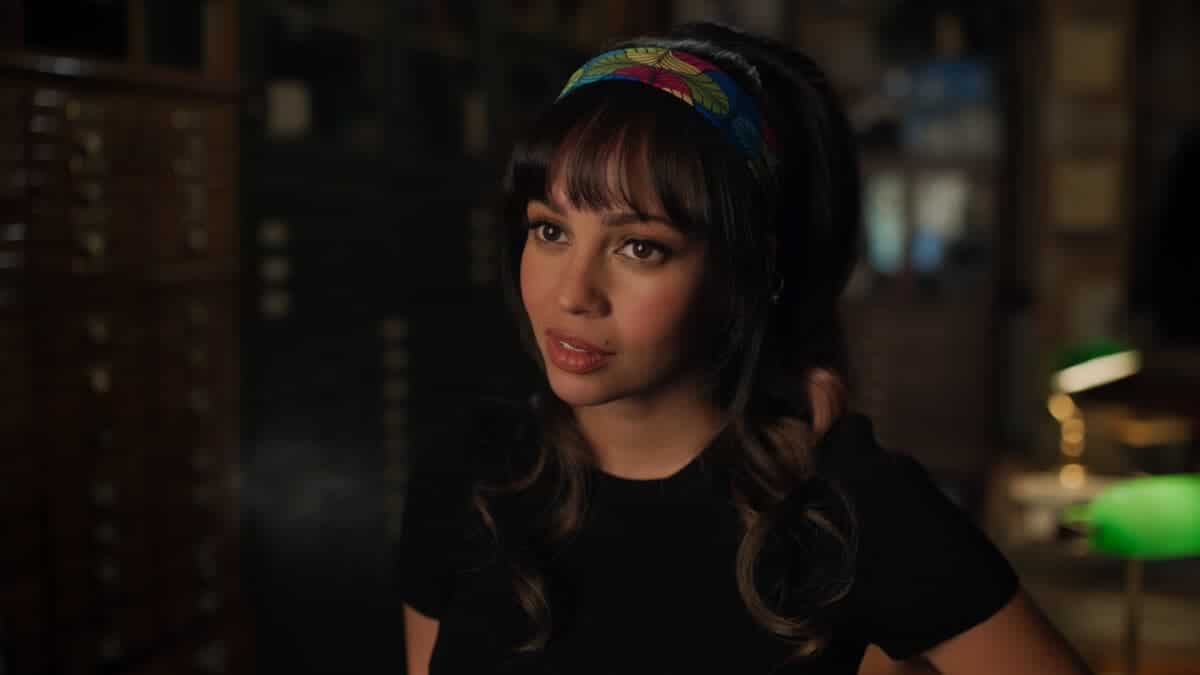Riverdale is the last show you might expect to tackle the rippling effects of the Emmett Till murder, but that’s exactly what the show did in its seventh season premiere.
The show that has taken the classic Archie characters from the present day to the past via a mystical comet has now invoked one of the most turbulent times in American history by having the characters discuss Till’s case and the effects it has on the wider world. According to Decider, the episode follows Toni Topaz (Vanessa Morgan) and Tabitha Tate (Erinn Westbrook), who have just come back from the trial of Till’s murderers and want to address the case in the school paper. While Betty (Lili Reinhart), the paper’s editor, is all for it, the principal isn’t. However, after Topaz and Tate take over the morning announcements to read Langston Hughes’ poem “Mississippi-1955,” a kind teacher allows his class to talk about how the case made them feel.
Showrunner Roberto Aguirre-Sacasa told Decider that he and the writers decided to tackle the big issues of the 1950s in order to address the reality of the time, not the fantasy.
“You know it was funny, when we first talked about doing the ’50s, one of the big questions that we talked about a lot in the writers room, and I talked a lot about with the cast was, are we going to play the reality of the 1950s? That for a certain kind of teenager they were great and super fun; and for the more marginalized groups, the characters of color, the queer characters, it was in fact a very repressive, racist, homophobic, horrible time,” he said, adding that the research the team did of the 1950s led them to juxtapose the death of James Dean (addressed in the sixth season) with Till’s death.
“…[W]hen we were doing research all around the time of the death of James Dean we realized there was another story that was obviously shaping the country, and that was the trial of the Emmett Till murderers,” he said. “And two stories about two teenagers, completely different, that spoke to the time period. That was the idea behind that.”
The episode ends with Tabitha giving a quote from Martin Luther King about the arc of justice, something Aguirre-Sacasa felt was poignant to do.
“…[W]e had established that Martin Luther King Jr. was one of Tabitha’s heroes in this series,” he said. “The idea was that in the ’50s it was a big turning point. It was before the Civil Rights Movement exploded. It was before the counterculture erupted, it was before Vietnam, it was before all these seismic changes happened. So we thought if we could tee up that our characters [are] on the cusp of all these social, racial, cultural, seismic shifts that were about to come, it would give the series a bit more thematic gravitas and allow us to tell more meaningful stories, along with all the fun trappings of the 1950s.”
The storyline seems to be part of Aguirre-Sacasa’s mission to right the wrongs of how Black characters and stories were initially treated on the show. The discrepancy was brought to light by Morgan, who wrote in a tweet in 2020, “Tired of how black people are portrayed in Media, tired of us being portrayed as thugs, dangerous or angry scary people. Tired of us also being used as sidekick non dimensional characters to our white leads. Or only used in the ads for diversity but not actually in the show.” She also tweeted how she felt that the series was using her for both Black representation and LGBTQ representation within her storyline, but “[t]oo bad I’m the only black series regular but also paid the least.”
Aguirre-Sacasa addressed Morgan’s statements, writing on social media, “We hear Vanessa. We love Vanessa. She’s right. We’re sorry and we make the same promise to you that we did to her. We will do better to honor her and the character she plays. As well as all of our actors of color. CHANGE is happening and will continue to happen. Riverdale will get bigger, not smaller. Riverdale will be a part of the movement, not outside it. All of the Riverdale writers made a donation to @BLMLA, but we know where the work must happen for us. In the writer’s room.” Other Black actresses before and after Morgan also complained about pay, poor storylines and dealing with racist fans.

